
I’ll admit it. When I hear the name Chekhov, the first words that pop into my head are dull, somber, and talky. That’s why it’s such a pleasure to report that the Antaeus Company’s revival of Anton Chekhov’s The Seagull not only held my attention virtually throughout, it actually had me laughing more times than I could count. Talky it still may be, with characters often choosing monolog over dialog, but wonder of wonders, Seagull director Andrew Traister and company have brought to life on the Deaf-West stage is indeed the comedy its playwright intended it to be.
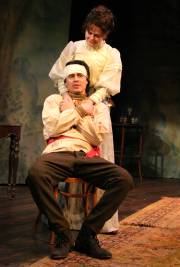
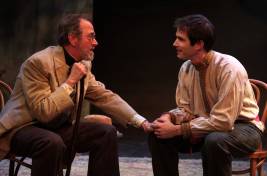 On the first of a pair of Opening Night performances, each with its own cast, Joanna Strapp’s Masha set the evening’s comical tone from the get-go, responding to her lovestruck suitor’s query about her all-black attire with an amusingly curt “I’m in mourning for my life,” as if to say, “What kind of dolt asks such an idiotic question when the answer is so obvious?” Strapp’s comedic gem of a performance gave Friday’s Opening Night audience permission to laugh alongside Chekhov at a cast of characters who take their lives Very Seriously Indeed.
On the first of a pair of Opening Night performances, each with its own cast, Joanna Strapp’s Masha set the evening’s comical tone from the get-go, responding to her lovestruck suitor’s query about her all-black attire with an amusingly curt “I’m in mourning for my life,” as if to say, “What kind of dolt asks such an idiotic question when the answer is so obvious?” Strapp’s comedic gem of a performance gave Friday’s Opening Night audience permission to laugh alongside Chekhov at a cast of characters who take their lives Very Seriously Indeed.
That these characters are the same as those we’ve seen played deadly dull in past productions is nothing short of astonishing, and yet here they are the opposite of dull. There’s 40something stage star Irina Nikolayevna Arkadina, a Diva with a capital D who is so certain of her ability to play a teenager that she proves it—at least to herself—by “tripping on tiptoe” as she imagines a fifteen-year-old girl would. Arkadina has a lover (what else would you expect from a Diva?), the renowned novelist Boris Alexeyevich Trigorin, who bemoans the fact that he will go to his grave “not as good as Turgenev.” The stage star’s twenty-five-year-old son, wannabe playwright Konstantin, is a manic-depressive sort whose plays are the kind of artsy-fartsy messes that still abound in “experimental theater.” Konstantin pines over actress-in-training Nina, a dreamy local girl who finds herself attracted to the far more dashing Trigorin. Meanwhile, 1890s Century goth chick Masha turns her back on her sweet but hotness-challenged suitor, the schoolteacher Medvedenko, in order to moon over Konstantin. Add to this bunch Arkadina’s ailing older brother Sorin, estate manager Shamrayev and his wife Paulina, the latter of whom might just be carrying on an affair with physician Dorn, plus a workman named Yakov and a nameless maid, and you have plenty of characters to keep us amused.
This is not to say that two-time Scenie-winning director Traister doesn’t have his sterling cast hit dramatic notes when necessary, or that performances are anything less than multilayered. It’s simply that both director and ensemble realize that Chekhov ought to be played more entertainingly than, say, paint drying.
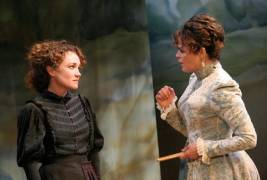
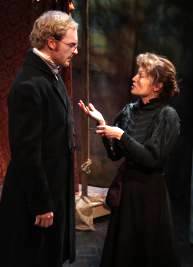 In my review of 2010’s The Autumn Garden, I wrote: “The Antaeus Company may well be the only major L.A. theatrical troupe to regularly double cast its productions, thereby allowing its members and guest artists to accept film and TV assignments without fear of jeopardizing an evening’s performance by their absence. Unlike understudies, who often get no more than a single rehearsal before going on, both Antaeus casts rehearse together equally, guaranteeing audiences fully-developed work regardless of which cast they see. If an actor has to miss a show, his or her alternate is available to join the cast on a moment’s notice.”
In my review of 2010’s The Autumn Garden, I wrote: “The Antaeus Company may well be the only major L.A. theatrical troupe to regularly double cast its productions, thereby allowing its members and guest artists to accept film and TV assignments without fear of jeopardizing an evening’s performance by their absence. Unlike understudies, who often get no more than a single rehearsal before going on, both Antaeus casts rehearse together equally, guaranteeing audiences fully-developed work regardless of which cast they see. If an actor has to miss a show, his or her alternate is available to join the cast on a moment’s notice.”
Prophetic words indeed, for this is precisely what happened on the Opening Night # 2 when “Samovars” leading lady Gigi Bermingham had the misfortune to be felled by food poisoning. Another company might have cancelled the performance, or thrown in an understudy with probably no more than a single pre-performance run-through, if that.
This being the Antaeus Company, however, the “Rubles” cast’s Arkadina, Laura Wernette, was available to step in to the role she had just played the night before, surrounded this time however by a brand-new son, lover, and assorted hangers-on. How about that for keeping an actress on her toes, a challenge Wernette met with divaesque dazzle, topping her already excellent First Opening Night star turn the second time around.
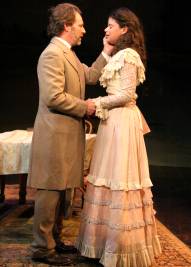
 Surrounding Wernette on Openings 1 & 2 were a pair of stellar ensembles made up of Brian Abraham, John Achorn, Bill Brochtrup, Avery Clyde, Joe Delafield, Dawn Didawick, Bo Foxworth, Gregory Itzin, Antonio Jaramillo, Janice Kent, Adrian LaTourelle, Micheal McShane, Armin Shimerman, Kurtwood Smith, Bonnie Snyder, Strapp, James Sutorius, Reba Waters, Patrick Wenk-Wolff, Jules Wilcox, and Abby Wilde.
Surrounding Wernette on Openings 1 & 2 were a pair of stellar ensembles made up of Brian Abraham, John Achorn, Bill Brochtrup, Avery Clyde, Joe Delafield, Dawn Didawick, Bo Foxworth, Gregory Itzin, Antonio Jaramillo, Janice Kent, Adrian LaTourelle, Micheal McShane, Armin Shimerman, Kurtwood Smith, Bonnie Snyder, Strapp, James Sutorius, Reba Waters, Patrick Wenk-Wolff, Jules Wilcox, and Abby Wilde.
It would be foolhardy for this reviewer to play favorites among the two casts, a case of equally flavorsome apples and bananas. Still, different actors bring different qualities to the roles they play, making a return visit well worth the purchase of another ticket.
To cite but a few examples, Jaramillo gives Konstantin a dark broodiness (and slight Mexican accent) while Delafield’s makes him more boyish and naïve. Pairing Strapp’s alto Masha with Brochtrup’s tenor Medvedenko creates quite different “harmonies” from those made by Clyde’s soprano Masha and Wenk-Wolff’s baritone Medvedenko. As for the Ninas, to put it in John Hughes’ Sixteen Candles terms, Wilde’s Nina is Molly Ringwald and Willcox’s is her older sister, the one Molly’s always been overshadowed by even though we know she’s every bit as special. In other words, the Antaeus Company’s double-casting is that rare case where “Separate But Equal” does indeed prove true.
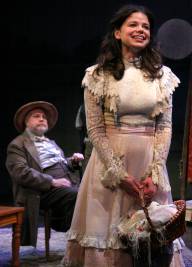
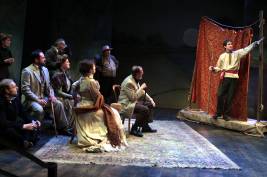 Past Antaeus Company productions have been design treats, and The Seagull is no exception. Lechetti Design’s scenic design gives this Seagull an impressionist watercolor look, one which Jeremy Pivnick lights exquisitely, never more so than when back lighting reveals the gauzy interior of Sorin’s country home previously hidden behind pastel river, trees, and sky. A. Jeffrey Schoenberg’s period costumes are as gorgeously detailed as we’ve come to expect from this master designer. Jeff Gardner’s sound design not only sets the mood musically but surrounds us with the sounds of a countryside summer or a blustery cold, windy winter’s night. Heather Ho’s impeccably selected property design complements all of the above. Lara E. Nall is stage manager.
Past Antaeus Company productions have been design treats, and The Seagull is no exception. Lechetti Design’s scenic design gives this Seagull an impressionist watercolor look, one which Jeremy Pivnick lights exquisitely, never more so than when back lighting reveals the gauzy interior of Sorin’s country home previously hidden behind pastel river, trees, and sky. A. Jeffrey Schoenberg’s period costumes are as gorgeously detailed as we’ve come to expect from this master designer. Jeff Gardner’s sound design not only sets the mood musically but surrounds us with the sounds of a countryside summer or a blustery cold, windy winter’s night. Heather Ho’s impeccably selected property design complements all of the above. Lara E. Nall is stage manager.
Following a dreary non-Antaeus production of one of Chekhov’s other classics last year, I wrote, “I think it’s likely that this reviewer will declare a moratorium on all things Chekhovian, at least for the foreseeable future.” That was a vow I’m more than glad to have broken for this brighter, breezier, and far more entertaining The Seagull.
Note: Members of both casts appear together in assorted computer-picked combinations on Thursdays and Fridays.
The Antaeus Company, Deaf West Theatre, 5112 Lankershim Blvd., North Hollywood.
www.Antaeus.org
–Steven Stanley
March 1 and 2, 2012
Photos of Rubles (l.) by Karianne Flaathen, Samovars (r.) by Alexandra Goodman


 Since 2007, Steven Stanley's StageSceneLA.com has spotlighted the best in Southern California theater via reviews, interviews, and its annual StageSceneLA Scenies.
Since 2007, Steven Stanley's StageSceneLA.com has spotlighted the best in Southern California theater via reviews, interviews, and its annual StageSceneLA Scenies.







 COPYRIGHT 2025 STEVEN STANLEY :: DESIGN BY
COPYRIGHT 2025 STEVEN STANLEY :: DESIGN BY